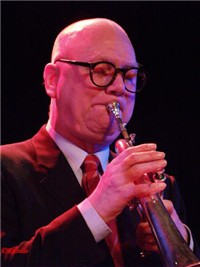| B i o g r a p h y |
 Franz Koglmann
(born 1947) is an Austrian jazz composer. He performs on both the
trumpet and flugelhorn in a variety of contexts, most often within
avant-garde jazz and third stream contexts. An award-winning composer,
Koglmann has performed or recorded with a variety of musicians,
including Lee Konitz, Paul Bley, Bill Dixon, Georg Gräwe, Andrea
Centazzo, Theo Jörgensmann, Wolfgang Reisinger, Enrico Rava, Yitzhak
Yedid, Ran Blake, John Lindberg and many others. When the Romanian town
of Sibiu commissioned Koglmann to write a piece, he brought together
bits from Haydn's 27th symphony with a tape recording of Sibiu native
Emil Cioran philosophisizing. Her received 2003 the highest Austrian
jazz award, the Hans Koller Prize in category "album of the year".
Franz Koglmann
(born 1947) is an Austrian jazz composer. He performs on both the
trumpet and flugelhorn in a variety of contexts, most often within
avant-garde jazz and third stream contexts. An award-winning composer,
Koglmann has performed or recorded with a variety of musicians,
including Lee Konitz, Paul Bley, Bill Dixon, Georg Gräwe, Andrea
Centazzo, Theo Jörgensmann, Wolfgang Reisinger, Enrico Rava, Yitzhak
Yedid, Ran Blake, John Lindberg and many others. When the Romanian town
of Sibiu commissioned Koglmann to write a piece, he brought together
bits from Haydn's 27th symphony with a tape recording of Sibiu native
Emil Cioran philosophisizing. Her received 2003 the highest Austrian
jazz award, the Hans Koller Prize in category "album of the year".
Most of the recordings of award-winning modern composer, trumpeter, and
flügelhorn player Franz Koglmann (and of his works) can be found on the
Hat labels (Hat Art, Hat Hut, etc.), although this may change since
Koglmann founded his own label, Between the Lines, in 1999.
Born near Vienna in 1947, Koglmann learned to play the trumpet and
flügelhorn and, by 1973, had founded his first record label, Pipe
Records, which released a few albums by Steve Lacy and Bill Dixon. In
1972 and 1976, Koglmann won the Music Award of the City of Vienna. His
album Opium/For Franz came out on Pipe Records in 1976. From the
mid-'70s through the mid-'80s, he was a member of the Improvising Music
Orchestra, in addition to performing in other groups, including the
Reform Art Unit (RAU) in the mid- to late '70s and pianist Georg
Graewe's Grubenklangorchester for a couple of years in the early '80s.
In 1983, Koglmann founded the Chamber Jazz Emsembles Pipetet, whose
debut recording, Schlaf Schlemmer, Schlaf Magritte, came out on the Hat
Art label the following year. Not too long after this, Koglmann began to
focus on composing.
He received the Music Award of the Republic of Austria for his
compositions in 1987, a state grant two years later, and, in 1990,
enjoyed the debut performance of his works in Vienna. The following
year, Koglmann was lauded by Wire magazine and in 1992 received the
Music Award of Lower Austria. The Hat label released other Koglmann
albums during this time, including The Use of Memory (Hat Art). His
Diapasson (on the French label Disque d'Or) was also voted Record of the
Year by the London Times in the early '90s. Melange de la Promenade
came out in 1993, as did one of his major works for Hat Art, Cantos
I-IV. Works by Franz Koglmann were performed at Wien Modern 1994 in
Cologne, at major festivals in Canada, and at the Knitting Factory in
N.Y.C. in 1995. The Austrian composer also received a second state grant
in 1995. Commissioned for the 1997 Vienna Festival, Koglmann composed
"Ein Heller, Lichter, Schöner Tag." This year also brought the release
of O Moon My Pin-Up, which won the Composers' Award from the Erste
Österreichischen Sparcasse.
In 1998, Austrian group Klangforum Wien debuted his work "Don't Play,
Just Be," and the following year, Koglmann recorded the first album for
his new Frankurt-based label Between the Lines. The album, entitled Make
Believe, featured Koglmann on trumpet and flügelhorn, along with reeds
player Tony Coe, guitarist Brad Shepik, and more, performing originals
by Koglmann with the exception of the title track by Jerome Kern. Over
the years, Koglmann has performed and recorded with renowned improvisers
such as guitarist Derek Bailey, saxophonist Lee Konitz (We Thought
About Duke Hat Hut, 1995), and pianist Paul Bley. By 2000, Franz
Koglmann still resided in the city of his birth.